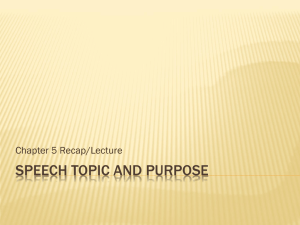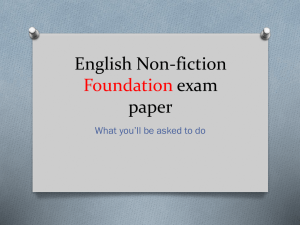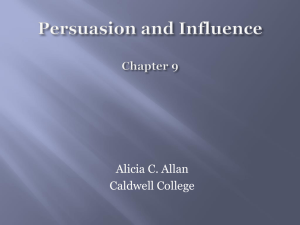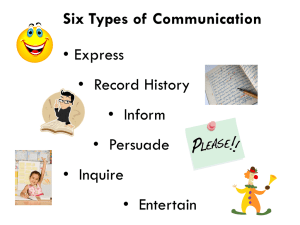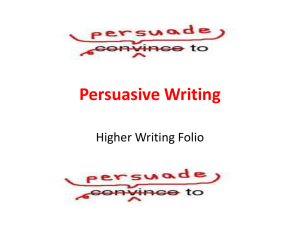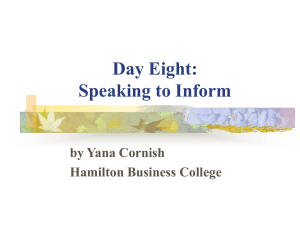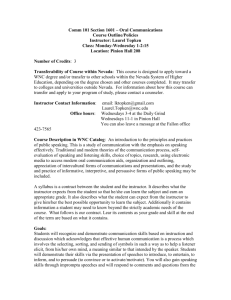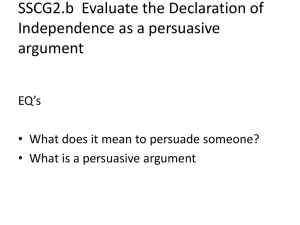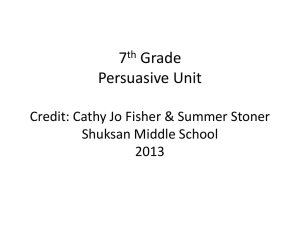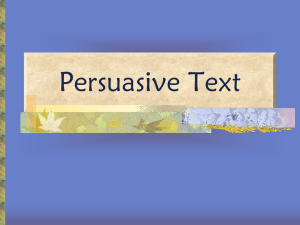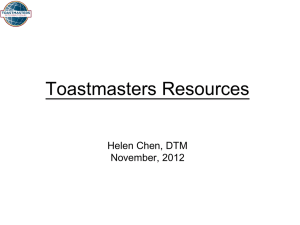Persuasion Notes
advertisement
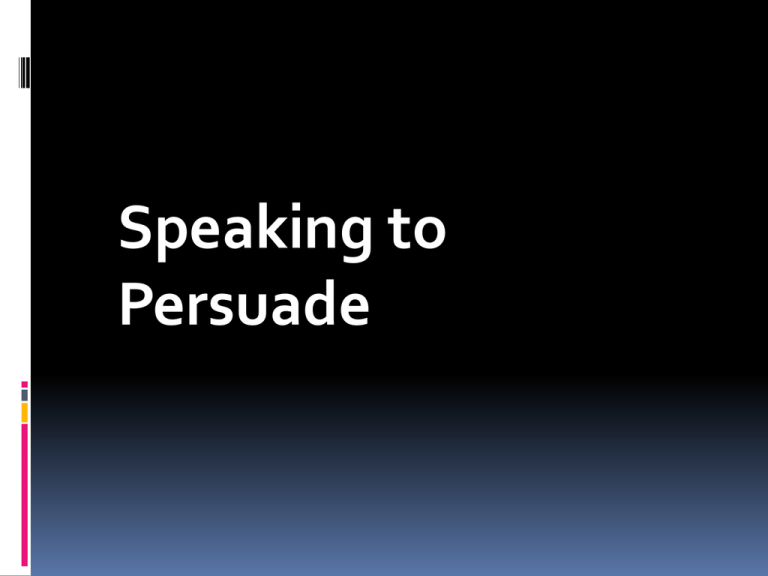
Speaking to Persuade Persuasion The process of creating, reinforcing, or changing people's beliefs or actions. Ethics and Persuasion Make sure your goals are ethically sound Use ethical methods to communicate your ideas Degrees of Persuasion Strongly Opposed Moderately Opposed Slightly Opposed Neutral Slightly in Favor Persuasion involves any movement by a listener from left to right Moderately in Favor Strongly in Favor Mental Dialogue with the Audience The mental give and take between speaker and listener during a persuasive speech. Target Audience The portion of the whole audience that the speaker most wants to persuade. Types of Persuasive Speeches Speeches on questions of fact Speeches on questions of value Speeches on questions of policy Question of Fact A question about the truth or falsity of an assertion. Persuasive Speech on a Question of Fact Specific Purpose: To persuade my audience that an earthquake of 9.0 or above on the Richter scale will hit California in the next ten years. Main Points: I. California is long overdue for a major earthquake. II. Many geological signs indicate that a major earthquake may happen soon. III. Experts agree that a major earthquake could hit California any day. Question of Value A question about the worth, rightness, morality, and so forth of an idea or action. Persuasive Speech on a Question of Value Specific Purpose: To persuade my audience that capital punishment is morally and legally wrong. Main Points: I. Capital punishment violates the biblical commandment “Thou shalt not kill.” II. Capital punishment violates the constitutional ban on “cruel and unusual punishment.” Question of Policy A question about whether a specific course of action should or should not be taken. Persuasive Speech on a Question of Policy Specific Purpose: To persuade my audience that our state should require mandatory recertification of lawyers every ten years. Main Points: I. Many citizens are victimized every year by incompetent lawyers. II. A bill requiring lawyers to stand for recertification every ten years will do much to help solve the problem. Fact, Value, or Policy? To persuade my audience that poaching is threatening the survival of animal species throughout the world. To persuade my audience that strong international action should be taken to solve the problem of poaching. Fact, Value, or Policy? A federal law should be passed requiring that trunk release systems be standard on all new cars sold in the United States. If trunk release systems were standard equipment on all cars sold in the United States, we could save a number of children’s lives each year. Types of Speeches on Questions of Policy Speeches to gain passive agreement Speeches to gain immediate action Speech to Gain Passive Agreement The speaker’s goal is to convince the audience that a given policy is desirable without encouraging the audience to take action in support of the policy. Specific Purposes for Speeches to Gain Passive Agreement To persuade my audience that there should be stricter safety standard on amusementpark rides. To persuade my audience that school districts should not allow soft-drink companies to stock their products in school vending machines. Speech to Gain Immediate Action The speaker’s goal is to convince the audience to take action in support of a given policy. Specific Purposes for Speeches to Gain Immediate Action To persuade my audience to donate time to become literacy tutors. To persuade my audience to vote in the next presidential election. Basic Issues of Policy Speeches Need Plan Practicality Need Is there a serious problem or need that requires a change from current policy? Plan If there is a problem with current policy, does the speaker have a plan to solve the problem? Practicality Will the speaker’s plan solve the problem? Will the speaker’s plan create new and more serious problems? Organizing Speeches on Questions of Policy Problem-solution order Problem-cause-solution order Comparative advantages order Monroe’s motivated sequence Problem-Solution Order Main point I: Documents the existence of a problem. Main point II: Presents a solution to the problem. Problem-Solution Order Specific Purpose: To persuade my audience that the use of antibacterial chemicals in household products is creating health and environmental problems. Main Points: I. The use of antibacterial chemicals in household products is a serious problem. II. Solving these problems requires a combination of government and consumer action. Problem-Cause-Solution Order Main point I: Main point II: Main point III: Documents the existence of a problem. Analyzes the causes of the problem. Presents a solution to the problem. Problem-Cause-Solution Order Specific Purpose: To persuade my audience that the age for full motor-vehicle driving privileges should be raised to 18. Main Points: I. The number of accidents and death involving teenage drivers is a serious national problem. II. There are four main causes of the problem. III. We can help solve these problems by raising the age for full driving privileges. Comparative Advantages Order Each main point explains why a speaker's solution to a problem is preferable to other potential solutions. Comparative Advantages Order Specific Purpose: To persuade my audience that the U.S. space program should put greater priority on unstaffed scientific missions. Main Points: I. Unstaffed scientific missions are less costly than staffed space flights. II. Unstaffed scientific missions provide more practical benefits than staffed space flights. Monroe’s Motivated Sequence A five-step sequence designed especially for organizing persuasive speeches that seek immediate action. Monroe’s Motivated Sequence Attention: Gain the attention of the audience Need: Show the need for change Satisfaction: Provide a solution to the need Monroe’s Motivated Sequence Visualization: Intensify desire for the solution by visualizing its benefits Action: Urge the audience to take action in support of the solution
